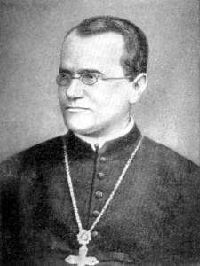-
(单词翻译:双击或拖选)

讲到遗传学,我们不能不提孟德尔。他的研究奠定了遗传学和现代生命科学的基础。1900年以后,世人才公认他对遗传学的贡献。据说他在1865年宣读论文的时候,台下的听众没几个人听得懂他在讲什么。
His name is introduced to biology students, but often forgotten after the final exam. His pioneering discoveries went unnoticed by the world until years after his death.
But now, in the era of genetic1 engineering and cloning debates, scientists are elevating Johann Gregor Mendel to his rightful place in history alongside better-known, 19th century contemporaries such as Charles Darwin.
Experts and scientists have collected artwork and artifacts inside the partially2 restored Abbey of St. Thomas in Brno, a Czech city where Mendel lived, experimented with pea plants and published his historic findings in 1866, becoming the "father of genetics."
The abbey, which dates from the 14th century, was seized from the Augustinian monks3 by communists in 1950 and returned to the religious order after the Velvet4 Revolution in 1989. A restoration project began in 1996. Yet much of the stone complex remains5 unused.
Mendel was born to a farming family in what's today the eastern Czech Republic. He became a priest in 1847 and later studied science at the University of Vienna. Fascinated by plant hybridization, he began experimenting in the abbey garden with pea plants.
During the 1850s Mendel carefully and systematically6 crossbred the plants until reaching conclusions that form the basis for the laws of heredity. He presented his landmark7 paper in 1865 and had it published the next year. But no one noticed.
According to scholars, Mendel's contemporaries failed to grasp the significance of his discoveries. But around 1900 -- long after his death in 1884 -- a British zoologist8 re-introduced the Czech scientist and his work, sparking an era of medical, agricultural and scientific progress that continues today.
Indeed, thanks to Mendel and his peas, modern man understands why children inherit their parents' traits, what roles are played by chromosomes9 and DNA10 in living things and how genetics can be used to improve human health.
More recently his findings led to the famous cloning of Dolly the sheep, as well as ethical11 debates over human cloning and farming with genetically12 modified crops.
点击 收听单词发音
收听单词发音
 收听单词发音
收听单词发音
1
genetic

|
|
| adj.遗传的,遗传学的 | |
参考例句: |
|
|
|
2
partially

|
|
| adv.部分地,从某些方面讲 | |
参考例句: |
|
|
|
3
monks

|
|
| n.修道士,僧侣( monk的名词复数 ) | |
参考例句: |
|
|
|
4
velvet

|
|
| n.丝绒,天鹅绒;adj.丝绒制的,柔软的 | |
参考例句: |
|
|
|
5
remains

|
|
| n.剩余物,残留物;遗体,遗迹 | |
参考例句: |
|
|
|
6
systematically

|
|
| adv.有系统地 | |
参考例句: |
|
|
|
7
landmark

|
|
| n.陆标,划时代的事,地界标 | |
参考例句: |
|
|
|
8
zoologist

|
|
| n.动物学家 | |
参考例句: |
|
|
|
9
chromosomes

|
|
| n.染色体( chromosome的名词复数 ) | |
参考例句: |
|
|
|
10
DNA

|
|
| (缩)deoxyribonucleic acid 脱氧核糖核酸 | |
参考例句: |
|
|
|
11
ethical

|
|
| adj.伦理的,道德的,合乎道德的 | |
参考例句: |
|
|
|
12
genetically

|
|
| adv.遗传上 | |
参考例句: |
|
|
|

















